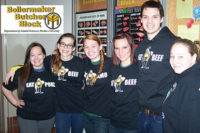Purdue University is once again an exciting place to study meat science. With the addition of two new faculty hires and a new meat lab on the way, the Purdue College of Agriculture has made it clear that meat science is important and valued as Indiana’s land-grant university. Stacy Zuelly, an assistant professor in meat science, serves as the Director of the Meat Science Program and is excited about the future.
“Our program has an amazing feeling of excitement that stems from the students, faculty, staff, and administration. We are thrilled about our new meat lab, and the enthusiasm for the program is palpable.” says Zuelly.
In addition to Zuelly’s hire in 2015, Purdue also hired Brad Kim and Blaine Brown in 2014. Brad is an assistant professor that specializes in meat color, shelf stability, and storage techniques to improve meat quality. Blaine serves as the Butcher Block manager facilitating teaching, extension and research.
With new faculty comes renewed student interest. For the first time Purdue University competed in the American Meat Science Association Undergraduate Quiz Bowl and Iron Chef Competition. Also, Derico Setyabrata won AMSA Undergraduate Research Competition. Additionally, Purdue Meat Science Club was recently established to continue to promote meat science activities and education to both undergrad and graduate students.
Another great asset at Purdue is the Boilermaker Butcher Block. The Butcher Block is a critical component of the current meat science courses by providing instruction and product for students to continue their meat science education. In the Meat Science course, students are required to work four hours in the Butcher Block to further their understanding outside of the classroom. In the Animal Growth, Development, and Evaluation course, over 40 animals are harvested to allow students to understand live evaluation in relation to carcass composition.
Public outreach is also valued in the Purdue Meat Science programs. Purdue hosted the National FFA Meat Evaluation CDE in October, 2016, and will remain the host university for the next nine years. Efforts are also being made to help the general public understand where their meat comes from, how it is raised, and how to safely prepare it at home. Finally, producer and processor education is continuing to be developed to provide valuable information for Indiana stakeholders.
What has contributed to this renewed enthusiasm at Purdue? Zuelly gives credit to the stakeholders in the state and the administrators at Purdue.
“We have a passionate animal agriculture industry in our state, so it critical we serve as educators and resources for that industry in Indiana and beyond.,” she explains.
Purdue University is a member of the American Meat Science Association. For more information about Purdue University and its faculty, please visit the AMSA website at http://www.meatscience.org/students/graduate-programs/purdue-university.




Report Abusive Comment